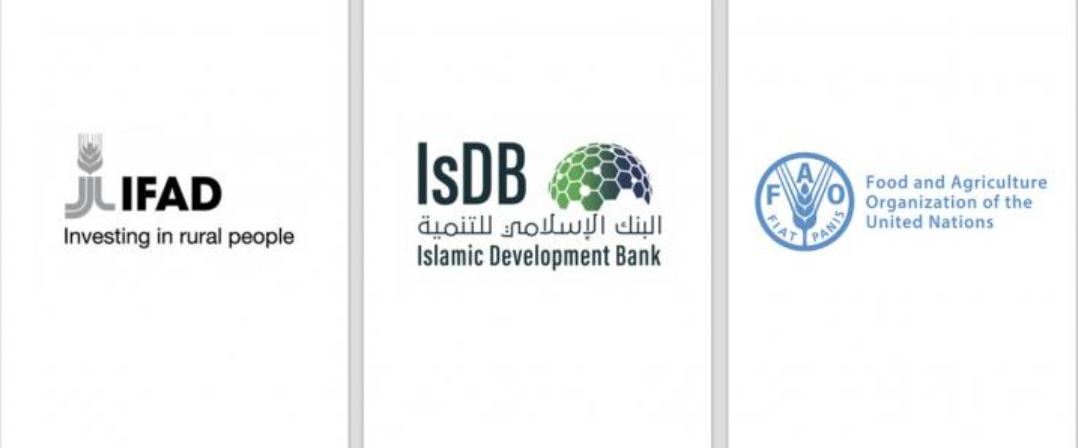In a significant stride towards enhancing global food security and nutrition, the Food and Agriculture Organization of the United Nations (FAO), the Islamic Development Bank (IsDB), and the International Fund for Agricultural Development (IFAD) have forged a trilateral partnership. This cooperation aims to empower rural smallholder farmers by offering them accessible, affordable, and adaptable technologies that are crucial for ensuring food security.
Read also: AfDB, South Korea to boost food security, vaccine production
A Transformative Collaboration for Food Security
Dr. Mansur Muhtar, IsDB’s Vice President of Operations, highlighted the importance of this collaboration in addressing the pressing challenges of food insecurity and malnutrition in IsDB Member Countries. He stated, “Our partnership with FAO and IFAD will play a pivotal role in identifying technologies suitable for integration into IsDB’s Food Security Response Program (FSRP) and other agricultural initiatives.” This alliance is poised to usher in transformative change in agricultural sustainability and food security across diverse regions.
AbdulHakim Elwaer, FAO Assistant Director-General and Regional Representative for the Near East and North Africa (NENA), emphasized the urgency of addressing food insecurity and malnutrition in the region. He stated, “A majority of countries in the Near East and North Africa region project increasing rates of food insecurity and malnutrition. These challenges are particularly more prevalent amongst small-scale farmers and pastoralist communities. The new tripartite cooperation between [these organisations] will facilitate identification of technologies that have the potential for mainstreaming throughout the crop value chain to improve livelihoods of smallholder farmers and food security among the entire populations.”
Harnessing Technology for Sustainable Agriculture
Technology has enabled small-scale producers to contribute effectively to sustainable agricultural development and food security. However, there remains an urgent need to increase capacities and accelerate innovation through partnerships. The current cooperation agreement is a major milestone in joining forces with other partners to help reach the United Nations Sustainable Development Goals and Saudi Vision 2030, as stated by Thouraya Triki, Director of Sustainable Production, Markets, and Institutions Division at IFAD. She added, “We aim through this agreement to share our knowledge and technical expertise with FAO and IsDB and benefit from this joint initiative to promote the scale of these technologies and strengthen the capacities of rural farmers to help them reduce costs and increase production, income, and food security.”
Empowering Rural Households for a Sustainable Future
These adaptable, transferable, and smart agricultural technologies and digital solutions will support low-carbon agriculture, improve resilience, alleviate poverty, create employment opportunities, and reduce vulnerability to climate-related risks. This collective initiative, aligned with the digital era, seeks to harness innovative tools and approaches to empower rural households and smallholder family farmers. These technologies are anticipated to enhance agricultural productivity and foster sustainable, low-carbon practices.
Through this tripartite partnership, FAO, IsDB, and IFAD aim to synergize their expertise and resources to uplift smallholder family farmers, bolster global food security, and cultivate a sustainable and resilient food supply. By integrating cutting-edge technologies into agricultural practices, this collaboration aspires to foster prosperity for communities worldwide, making significant strides towards achieving global food security.
About FAO, IsDB and IFAD
The Food and Agriculture Organization (FAO) is a specialized agency of the United Nations dedicated to leading international efforts to defeat hunger. FAO’s overarching goal is to achieve food security for all and ensure that people worldwide have regular access to sufficient, high-quality food, enabling them to lead active and healthy lives. With a membership of over 194 countries, FAO operates in more than 130 nations around the globe.
The Islamic Development Bank (IsDB) is a multilateral development finance institution that operates in accordance with Islamic principles, working tirelessly to foster economic and social progress within its Member Countries. IsDB actively supports a wide range of projects and initiatives designed to have a positive impact on communities across various sectors.
IFAD, the International Fund for Agricultural Development, is an international financial institution and a specialized agency of the United Nations. Headquartered in Rome, it focuses on investing in rural populations, empowering them to reduce poverty, enhance food security, improve nutrition, and strengthen resilience. Since its establishment in 1978, IFAD has provided over US$24 billion in grants and low-interest loans to fund development projects in numerous developing countries.
